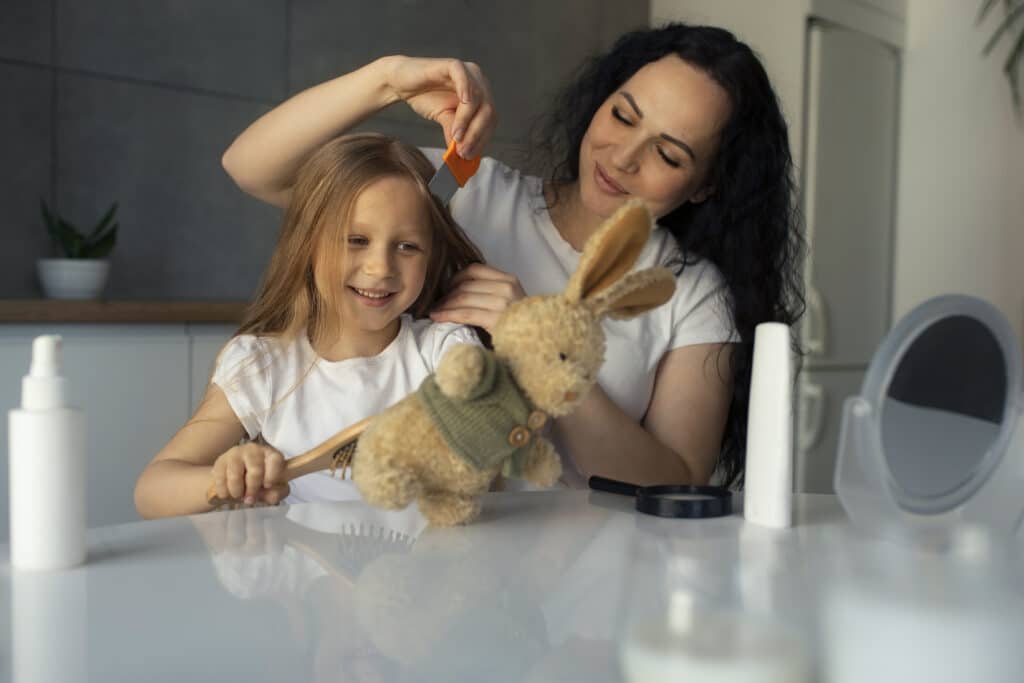As a parent, dealing with personal care products for a child can be really overwhelming. One of the most common concerns includes children developing body odor, which usually starts when puberty strikes. The crucial question which parents ask themselves: “Is deodorant safe for kids?” Body odor during puberty can become a problem, but finding safe, effective solutions-especially for those with sensitive skin-is critical.
That’s why, in the next section of this manual, it will be considering everything you should know when it comes to deodorants for kids: how and when you should introduce them, what ingredients to avoid, and some of the best recommendations for sensitive skin.
Why Do Kids Start to Smell?
Between the ages of approximately 8 and 13, at the beginning of puberty, many physical changes begin to take place within a child’s body, one of them being body odor. This is mostly due to the increased activity of sweat glands. Generally speaking, sweat itself is odorless; however, bacteria on the skin decompose it, thus emitting unpleasant smells. Most noticeable, this happens in parts of the body where there are more active sweat glands: underarms and feet.
The development of body odor has been attributed to the increase of androgens, a class of hormones whose development is prevalent during puberty. Androgens increase the amount of sweat produced by the apocrine glands present in certain regions of the body, such as the armpits and groin areas. These glands produce a type of sweat that is thicker in nature and, therefore, more subject to bacterial break-down leading to odour. This is also the reason why some children start developing body odor earlier than their peers, others do not; all that depends on when the levels of the hormone start to rise.
When Should Kids Start Using Deodorant?
There’s no specific age at which kids should start using deodorant, as every child develops at their own pace. Most kids, though, don’t start needing deodorant until they reach puberty. This can be anywhere between ages 8 to early teens years. Some children may experience this sooner, based on their physical activity level, since kids that are more active will have more body odor from sweating.
The American Academy of Pediatrics has declared that using deodorant is safe once children reach puberty. However, it all goes down to your child’s skin type and sensitivity, and more so, specific ingredients within the deodorant formula that can act as an irritant, or even worse-an allergen.
Is Deodorant Safe for Kids?
Well, deodorant is generally safe for kids. However, there are a couple of major things parents should bear in mind. Younger children have skin that may be more sensitive than adults; thus, it is highly important to choose deodorants specifically made for kids or those boasting natural hypo-allergic ingredients.
One thing to know is that not all deodorants are antiperspirants and vice versa. Deodorants simply mask or neutralize body odor, while antiperspirants prohibit the production of sweat. Most adult antiperspirants contain aluminum-based compounds that block the apocrine glands’ ability to excrete sweat and often are pretty effective in this regard. Parents might want to avoid using such ingredients on kids. Discussion of aluminum has raised a variety of questions about possible health risks, although such findings as yet remain very inconclusive.
For kids, especially those with sensitive skin, it’s often best to avoid products with harsh chemicals, such as aluminum compounds, parabens, and synthetic fragrances, as these can irritate the skin or cause allergic reactions.
Ingredients to Avoid in Deodorants for Kids
When you take out time to select a deodorant for your child, especially if he/she has sensitive skin, it will be important to pay great attention to the ingredients. Some of the common ingredients of adult deodorants may not be suitable for children. A few ingredients to watch out for are mentioned below:
1. Parabens
Parabens are synthetic preservatives that companies use to prolong the shelf life of batches of personal care products. However, they are associated with hormone disruption and skin irritation. In cases where children may have sensitive skin, parabens can further aggravate rashes and irritations. One should look for deodorants labeled as “paraben-free.”
2. Aluminum Compounds
Most antiperspirants contain various aluminum compounds which block the sweat glands, reducing perspiration. But though it sounds good, it irritates the skin, especially in children. Also, a few studies link aluminum with certain health hazards, but there is no concrete evidence. Many parents like to avoid this ingredient too and use deodorants without it.
3. Phthalates
General use of phthalates includes adding longevity to fragrances in deodorants, with the expectation of possible complications with endocrine disruption. Evading phthalates is most important among the kids because the development of their bodies is still under process; they may have ill effects due to disturbance in their hormones.
4. Synthetic Fragrances
Fragrance is one of the leading causes of allergic reactions and skin irritation in children and adults. Synthetic fragrances used in most deodorants are a combination of various chemicals that can make children, especially those with sensitive skin, more prone to sensitivities. Always go for a fragrance-free or naturally scented deodorant to avoid this as much as possible.
5. Propylene Glycol
Propylene glycol is an artificial chemical that provides the feel and texture many skin products desire. This aids in softening the skin and keeping it hydrated but irritates or causes allergic reactions when applied on very sensitive skin. Children with sensitive skin are prone to reacting from this ingredient, so going for products not containing it is better.
Natural Ingredients That Are Safe
Instead of these harsh chemicals mentioned above, go for deodorants whose active constituents are skin-friendly, natural ingredients. Following are some of the common natural ingredients which kid-friendly deodorants boast of:
1. Coconut Oil
Coconut oil has antimicrobial properties, which reduce bacteria causing body odor. It is natural and light on the skin, thus providing all-natural moisture to the skin, making it ideal for sensitive skin.
2. Shea Butter
Shea butter is one of those soothing, moisturizing agents in use within many natural skin care products. It’s going to help hydrate skin while being kind and non-irritating; hence, very appropriate for kids’ sensitive skin.
3. Arrowroot Powder
Arrowroot Powder: Arrowroot powder is a type of natural starch derived from tropical plants. It absorbs all the moisture, keeping the skin dry without incorporating any harmful chemicals like aluminum. This makes it a great alternative for kids who require moisture control without causing irritation.
4. Essential Oils
These would be lavender, tea tree, and eucalyptus, which will give the deodorant a fresh, clean scent while providing a few antibacterial properties, all without certain risks associated with synthetic fragrances. Be careful, though, because some essential oils can also be irritating for very sensitive skin.
Top 10 Best Deodorants for Kids With Sensitive Skin
We did some serious research and rounded up a list of the most effective deodorants for kids, particularly those with sensitive skin. The following deodorants avoid harsh chemicals and instead utilize mild, natural ingredients to keep your child fresh and odor-free.
1. Tom’s of Maine Wicked Cool! Deodorant for Kids
As usual, Tom’s of Maine sells nothing but natural products. Their Wicked Cool! Deodorant for Kids contains no aluminum, parabens, or artificial fragrances. In that regard, it should be great for even the youngest of children, with sensitive skin. It is naturally fragrant but mild in smell and does not overpower. The odors are at bay for a pretty long time.
2. Fresh Kidz Natural Roll-On Deodorant
Parents embraced Fresh Kidz for incorporating natural formulation into their deodorants. This aluminum-free, paraben-free, and synthetic fragrance-free deodorant is specifically suited for those children who easily develop skin irritations. The boys’ and girls’ versions are slightly and pleasantly scented for kids’ appeal.
3. Native Deodorant
While Native Deodorant isn’t exactly marketed for kids, the formula in it is very delicate and is really good for young skin. Native deodorants avoid harsh chemicals, including parabens, sulfates, and aluminum. Instead, natural ingredients like baking soda, coconut oil, and shea butter take over with soothing and truly effective protection.
4. Truly’s Natural Deodorant for Sensitive Skin
Truly’s is a fragrance-free option to keep your child smelling fresh all day long using simple, natural ingredients like coconut oil, powdered sugar, and baking soda. This makes it an excellent choice for kids who need a product without any added fragrance and is gentle enough for even the most sensitive skin.
5. TBH Kids Deodorant
TBH was specifically designed for tweens with a formula that contains no aluminum, parabens, or synthetic fragrances. Instead, it harnesses the power of witch hazel and coconut oil to naturally neutralize odor. And let’s not lie, the fun packaging is another thing kids love about this deodorant.
6. Keep It Kind Fresh Kidz Deodorant
Keep It Kind Fresh Kidz deodorant keeps odor at bay without the use of harsh chemicals but natural antibacterial ingredients. It is completely free of aluminum, parabens, and synthetic fragrances, hence ideal for kids even with the most sensitive skin. This deodorant comes in an array of pleasant scents that kids will enjoy.
7. Hello Fragrance-Free Deodorant with Shea Butter
Another great option for kids who are really sensitive to fragrances is Hello’s fragrance-free deodorant. The formula includes calming, skin-soothing ingredients like coconut oil, tea tree oil, and shea butter. Baking soda and arrowroot powder work in tandem for effective moisture absorption and odor neutralization.
8. Crystal Mineral Deodorant Stick
Crystal Mineral Deodorant is made from natural mineral salts that create a preventative barrier to the formation of odor-causing bacteria. It is hypoallergenic and free from all harmful chemicals, such as aluminum, parabens, and synthetic fragrances. It’s great for bigger kids who need longer protection with no irritation to the skin.
9. Pretty Frank Baking Soda-Free Deodorant
In the case of the children who develop sensitivity to baking soda, Pretty Frank offers a no-bake soda formula that’s also aluminum-free. Alternatively, this deodorant utilizes magnesium hydroxide and arrowroot powder for natural odor fighting without skin irritation.
10. Lume Deodorant for Kids
Lume Deodorant has been known for long-lasting odor protection and a formula that is considered harmless. Free from all forms of aluminum, parabens, phthalates, and artificial fragrances, Lume’s 72-hour protection gives parents confidence in their selection. Its gentle formula is suitable for kids with sensitive skin, and it comes in several pleasant scents.
Tips for Introducing Deodorant to Your Child
Introducing deodorant to your child can be a rather smooth affair, provided you go about it the right way. Following is a list that may help to make this transition just that bit easier:
1. Begin with Natural Products
Try using deodorants containing natural ingredients and being hypoallergenic; you certainly do not want any skin irritants. Products developed especially for kids or those with sensitive skin are generally your best bet.
2. Explain Proper Application
How to use it: Teach them to apply the deodorant after showering or bathing and that the skin should be dry before applying the product. Application on dry skin ensures it works more effectively.
3. Go for Mild, Kid-Friendly Scents
Some kids might have some sensitivity to strong-smelling perfumes, so try using products with soft, light fragrances or maybe even fragrance-free, which minimize the risk of irritation or discomfort.
4. Skin Reactions Are Normal
Immediately after introducing a new deodorant, closely monitor your child’s skin for any rashes, redness, or irritation. If those symptoms do occur, stop using the product right away and try another one or consult with a dermatologist for suggestions.
How to Choose the Right Deodorant for Your Child
When you are buying deodorants for your kids, here are some of the key things you should be looking at to make a purchase that will suit your child’s needs. These include:
1. Skin Sensitivity
If your child has sensitive skin or a history of allergies, find a hypoallergenic, fragrance-free deodorant that uses gentle, natural ingredients. Try avoiding products containing harsh chemicals that may even have a slight chance of irritating the skin.
2. Type of Deodorant
Depending on ease of application and personal preference, you can choose whether a product is available in a roll-on, stick, or cream formula. Kids love applying deodorants in the form of a roll-on or stick, while cream formulas provide added soothing for very sensitive skin.
3. Natural Ingredients
Opt for those deodorants prepared from natural ingredients that would not result in any harmful reaction to the skin or health of the child. Coconut oil, shea butter, and arrowroot powder are among the most excellent lotions used in giving light yet effective odor protection.
4. Lasting Protection
For highly active children or for those into sports, find deodorants that provide longer protection against odor. Some organic deodorants will have protection for as long as 72 hours, ideal for kids who have busy and active lifestyles.
Frequently Asked Questions
Q: Are deodorants safe to use on young children?
Yes, deodorant is generally safe for kids, especially if you go for natural and hypoallergenic products. Beware of any heavy chemicals like parabens, aluminum, or synthetic fragrances, for these only flare up the skin.
What’s the difference between a deodorant and an antiperspirant?
Deodorants conceal or neutralize odor, while antiperspirants block off perspiration by giving the skin an application of aluminum-based compounds. Many parents would prefer deodorants for kids to avoid all possible risks associated with aluminum-based antiperspirants.
Can kids with sensitive skin use deodorant?
Yes, but it’s necessary to select only those products without any harsh chemicals, synthetic fragrances, and allergens. The natural soothing ingredients on skin may include coconut oil, shea butter, and essential oils.
At what age should my child start using deodorant?
There isn’t a specific age, but most kids begin using deodorant when their bodies start developing the ability to produce body odor. That could be as young as 8 years old or right into their teen years. So watch your child’s needs, and when the time is right, introduce them to deodorant.
How will I tell if my child is allergic to deodorant?
Specific warning signs to look for include: redness, rashes, or irritation after using a deodorant. If your child experiences any of these symptoms, stop using the product and ask a dermatologist for suggestions. You may find that the problem goes away after switching to a hypoallergenic or fragrance-free deodorant.
The following comprehensive guide is directed at arming the parents with the best deodorant for a child, especially when sensitive skin is at issue. From how body odor develops, which ingredients to avoid, and on to how to choose the best on the market, this guide covers the bases so as to equip you with the knowledge to make an informed decision. The bottom line is a fresh, confident, comfortable child, and that is exactly what you can have once you find the right deodorant.really safe for kids, particularly if you opt for natural, hypoallergenic products. Be sure to avoid harsh chemicals like parabens, aluminum, and synthetic fragrances, which can cause skin irritation.
What’s the difference between deodorant and antiperspirant?
Deodorants mask or neutralize odor, while antiperspirants block sweat by using aluminum-based compounds. Many parents prefer deodorants for kids to avoid the potential risks associated with aluminum-based antiperspirants.
Can kids with sensitive skin use deodorant?
Yes, but it’s crucial to choose products that are free from harsh chemicals, synthetic fragrances, and allergens. Look for natural ingredients that are gentle on the skin, such as coconut oil, shea butter, and essential oils.
At what age should my child start using deodorant?
There’s no specific age, but most kids begin needing deodorant when they start experiencing body odor, which can occur as early as age 8 or as late as the teenage years. Monitor your child’s needs and introduce deodorant when necessary.
How do I know if my child is allergic to deodorant?
Look out for signs of irritation such as redness, rashes, or itchiness after using deodorant. If your child experiences any of these symptoms, stop using the product and consult a dermatologist for advice. Switching to a hypoallergenic or fragrance-free deodorant may help resolve the issue.
Conclusion:
This comprehensive guide aims to help parents navigate the often overwhelming process of choosing the right deodorant for their child, particularly for those with sensitive skin. From understanding the causes of body odor to knowing what ingredients to avoid and selecting the best products on the market, this guide provides all the information you need to make an informed decision. Ensuring your child feels fresh, confident, and comfortable is the ultimate goal, and with the right deodorant, you can achieve just that
















